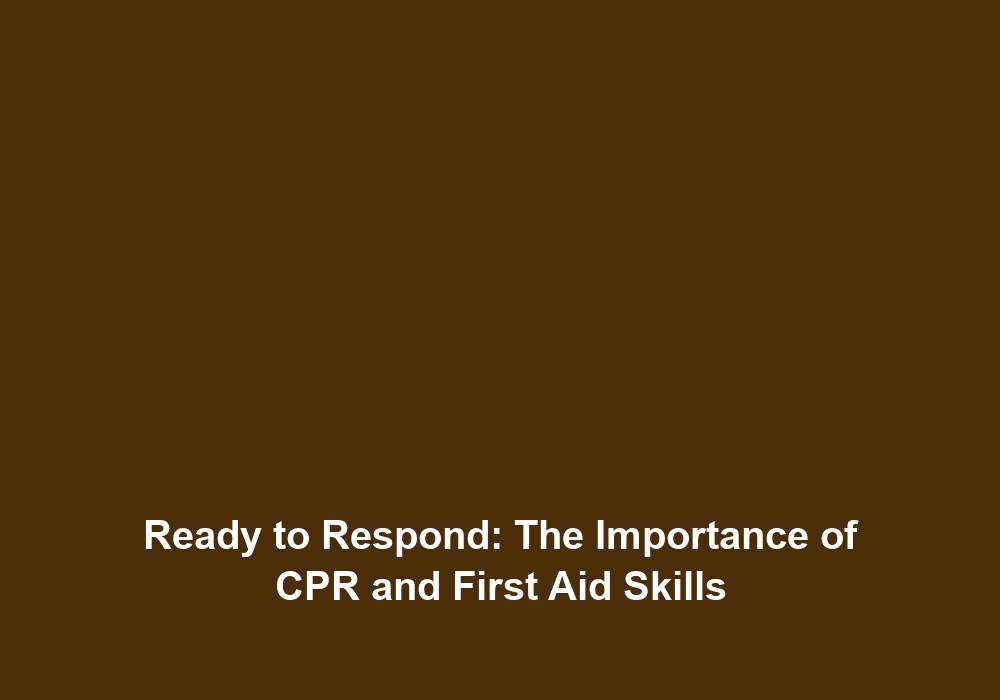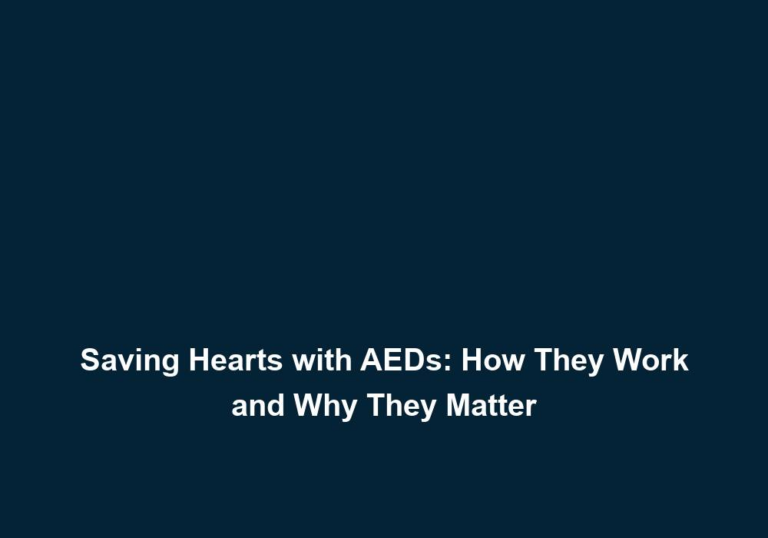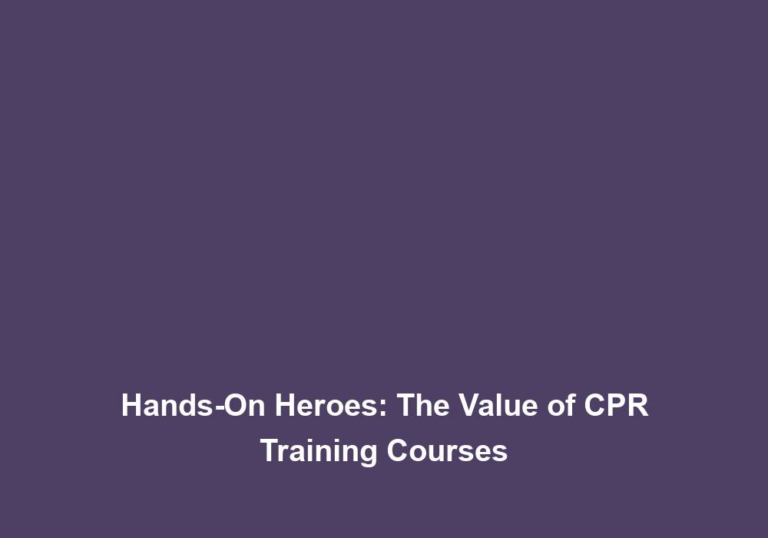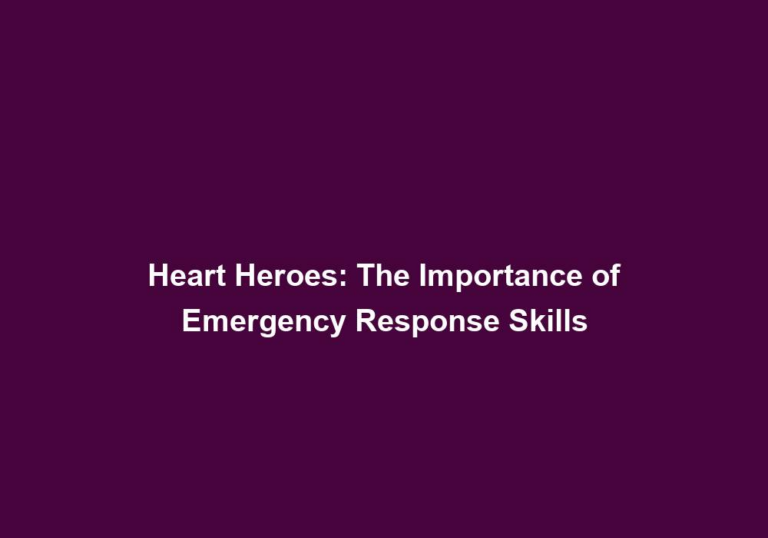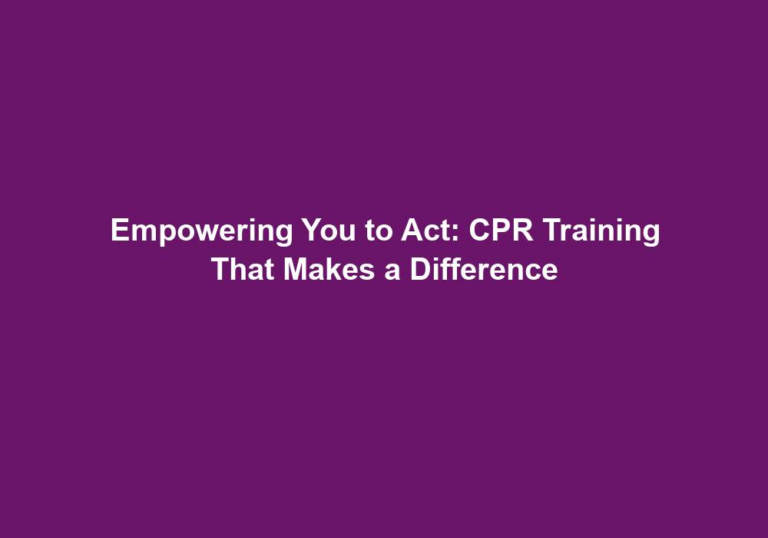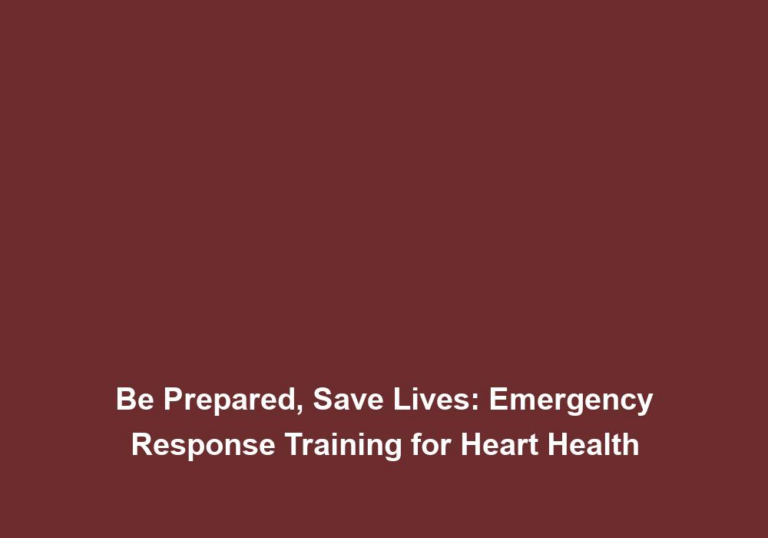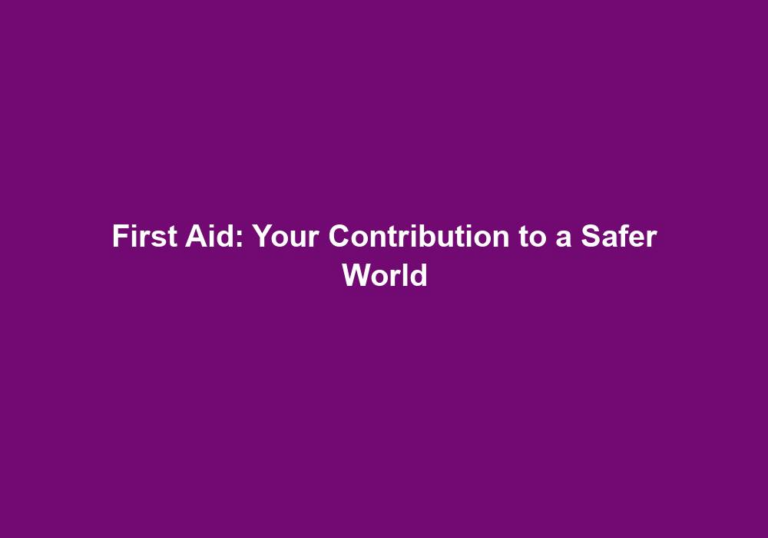Ready to Respond: The Importance of CPR and First Aid Skills
When emergencies strike, being equipped with crucial life-saving skills such as CPR (Cardiopulmonary Resuscitation) and first aid can make a significant difference between life and death. These essential skills empower individuals to become immediate responders, enabling them to provide immediate care and support until professional medical assistance arrives. In this article, we will explore the immense importance of CPR and first aid skills, highlighting their significance in various emergency situations.
The Vital Role of CPR
Cardiac arrest is a life-threatening emergency that occurs when the heart suddenly stops beating effectively. In such instances, immediate action is crucial to ensure the patient’s survival. This is where CPR becomes a crucial skill that can be the difference between life and death. CPR is a combination of rescue breaths and chest compressions that help circulate blood and oxygen throughout the body, maintaining vital organ function until medical help arrives.
Importance of Early CPR
Performing CPR promptly after someone experiences cardiac arrest is vital as it increases their chances of survival. Studies have shown that the chances of successful resuscitation decrease by about 10% with every passing minute without CPR. By initiating CPR within the first few minutes, the chances of a positive outcome can be significantly improved.
Prompt initiation of CPR is crucial because it helps maintain blood circulation and oxygen supply to vital organs, such as the brain and heart. Without oxygen-rich blood flow, these organs can quickly become damaged, leading to irreversible complications or death. By performing CPR early on, individuals can effectively bridge the gap between the occurrence of cardiac arrest and the arrival of professional medical help.
Widespread Applicability of CPR
CPR skills are not limited to healthcare professionals or medical personnel. On the contrary, they can be learned and applied by anyone, regardless of their background. Whether it’s a family member, a co-worker, or a passerby, anyone with CPR skills can provide immediate assistance to someone in need. By taking a CPR certification course, individuals can gain the knowledge and confidence to respond effectively during emergencies.
Moreover, CPR is not only applicable in cases of cardiac arrest. It can also be beneficial in situations where breathing and heart function are compromised, such as near-drowning incidents or drug overdoses. By having a comprehensive understanding of CPR techniques, individuals can adapt their responses to various emergency scenarios, increasing the chances of a positive outcome.
The Importance of First Aid Skills
In addition to CPR, first aid skills are equally important in emergency situations. First aid refers to the initial care provided to an injured or ill person before professional medical help is available. These skills can be life-saving and prevent further injury or deterioration of a person’s condition.
Immediate Response
First aid skills enable individuals to respond immediately when someone is injured or falls ill. By administering basic first aid techniques, such as stopping bleeding, immobilizing fractures, or administering CPR, individuals can stabilize the patient’s condition, prevent further harm, and potentially save their life.
For example, in cases of severe bleeding, applying direct pressure to the wound can help control the bleeding and minimize the risk of excessive blood loss. Similarly, performing the Heimlich maneuver on a choking individual can dislodge the obstruction and restore normal breathing. These immediate responses can significantly improve the chances of a positive outcome and prevent the situation from worsening.
Minimizing the Impact of Injuries
In many emergency situations, quick and appropriate first aid can help minimize the long-term impact of injuries. For instance, providing immediate care for a burn can help alleviate pain, prevent infection, and promote faster healing. Similarly, proper handling of sprains or fractures can prevent further damage and expedite recovery.
By having a comprehensive understanding of first aid techniques, individuals can effectively assess and manage injuries until professional medical help arrives. This proactive approach not only minimizes the immediate impact of the injury but also enhances the overall recovery process, reducing the risk of long-term complications.
Common Situations Where First Aid Skills Are Essential
First aid skills are applicable in various situations, including:
-
Accidents and Injuries: Whether it’s a minor cut, a burn, a fall, or a more severe accident, having first aid skills allows individuals to provide immediate care until medical professionals arrive. By promptly addressing injuries, individuals can prevent complications, reduce pain, and improve the chances of a successful recovery.
-
Choking: Prompt action through the Heimlich maneuver can help dislodge obstructions and restore breathing. By knowing how to identify and respond to choking incidents, individuals can potentially save lives and prevent severe complications.
-
Allergic Reactions: Administering epinephrine through an auto-injector can be life-saving during severe allergic reactions. By recognizing the signs of an allergic reaction and knowing how to administer the necessary medication, individuals can mitigate the risks associated with such emergencies.
-
Heart Attacks: Recognizing the symptoms and providing appropriate first aid, such as calling emergency services and assisting with medication, can be critical in heart attack situations. By acting swiftly and confidently, individuals can help stabilize the patient’s condition and improve the chances of a positive outcome.
By acquiring first aid skills, individuals can become confident and competent first responders, making a significant impact during emergencies.
The Benefits of CPR and First Aid Training
Acquiring CPR and first aid skills through certified training programs can offer numerous benefits. These programs are designed to provide comprehensive knowledge and hands-on practice, ensuring individuals are well-prepared to handle emergencies effectively.
Confidence and Readiness
CPR and first aid training instills confidence in individuals, enabling them to respond effectively during crises. By learning and practicing these skills, individuals become better prepared to handle emergency situations, making split-second decisions with clarity and efficiency.
Moreover, training programs often simulate real-life scenarios, allowing individuals to apply their knowledge and skills in a controlled environment. This hands-on experience enhances their readiness to respond during actual emergencies, reducing anxiety and promoting effective action.
Workplace Safety
In many workplaces, having employees trained in CPR and first aid is not only beneficial but also a legal requirement. By ensuring employees have these skills, workplaces become safer environments, reducing the risk of accidents and potentially saving lives.
Employers who invest in CPR and first aid training demonstrate their commitment to the well-being of their workforce. By equipping employees with life-saving skills, they create a culture of safety and preparedness, fostering a positive work environment and enhancing overall productivity.
Personal Safety and Peace of Mind
Apart from professional settings, individuals with CPR and first aid skills can enhance their personal safety and the well-being of their loved ones. Whether at home, during travel, or in public spaces, knowing how to respond during emergencies brings peace of mind and the ability to take immediate action when required.
By having the knowledge and skills to provide immediate care, individuals can effectively address injuries or medical emergencies that may occur in their daily lives. This personal preparedness not only ensures their safety but also extends to the safety of their family members, friends, and even strangers they may encounter in emergency situations.
Community Impact
By acquiring CPR and first aid skills, individuals contribute to their community’s safety and well-being. They become valuable assets during emergencies, capable of providing immediate assistance until professional help arrives. This collective effort can save lives and foster a sense of community resilience.
Communities with a higher number of trained individuals have a stronger capacity to respond to emergencies effectively. By promoting CPR and first aid training within the community, individuals can empower their neighbors and create a network of responders, creating a safer and more resilient community as a whole.
In conclusion, the importance of CPR and first aid skills cannot be overstated. These life-saving techniques enable individuals to become immediate responders, making a critical difference during emergencies. By acquiring these skills through certified training programs, individuals gain the knowledge, confidence, and ability to provide essential care and potentially save lives. Whether in the workplace or everyday life, being ready to respond can truly make a world of difference.

